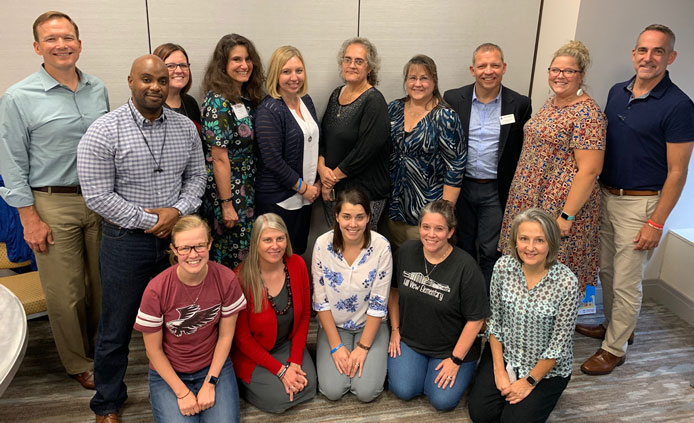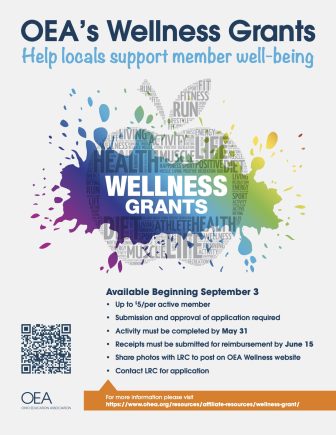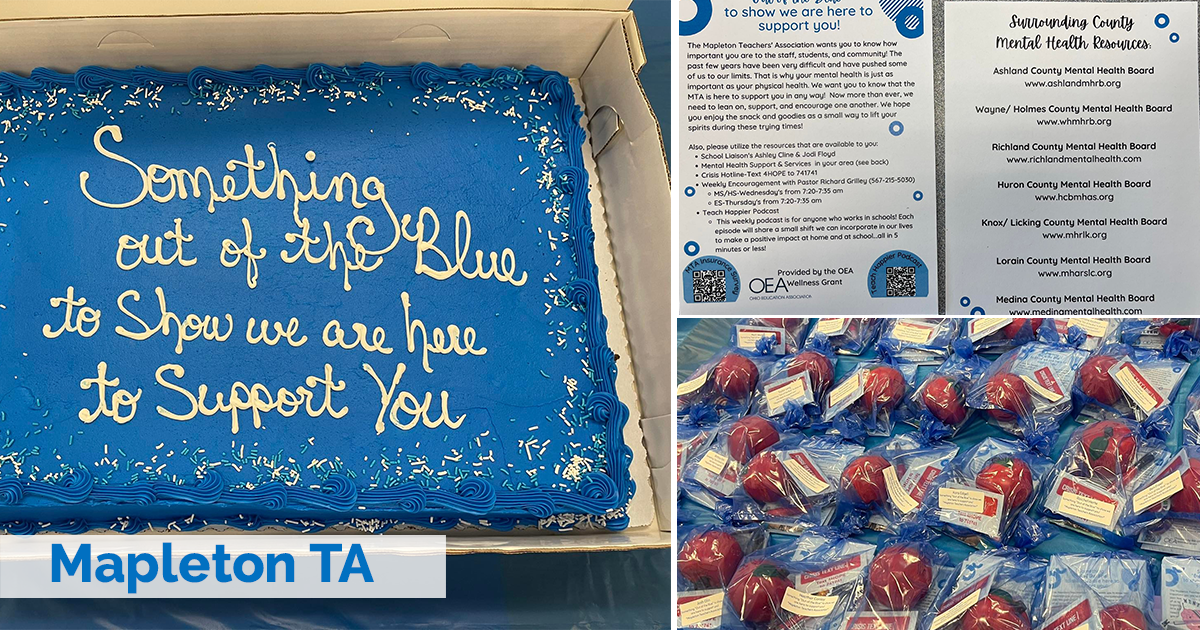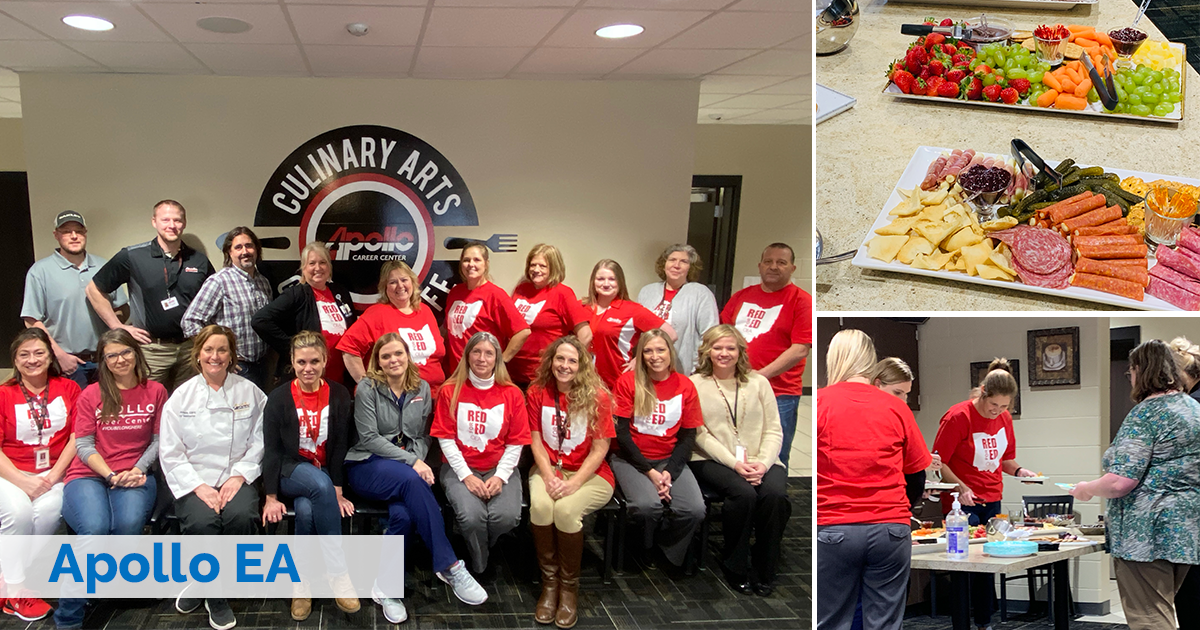December – January 2022 Ohio Schools
- COVER STORY: Stepping Up for Schools
- Educator voice key to successful school board races in Ohio
- NOTEBOOK
- OEA Local Associations Stand in solidarity for Members and Students
- MAKING THE GRADE
- Findlay Paraprofessionals Form OEA’s Newest Local Association
- OEA Members Receive Top Educator Awards from Martha Holden Jennings Foundation
Moved recently? Contact the OEA Member Hotline to update the address on file at 1-844-OEA-Info (1-844-632-4636) or email, membership@ohea.org. Representatives are available Monday-Friday, from 8:30 a.m. to 6 p.m. | OhioSchools — Past Issues

 Oh Yes, We’re Social — Join the Conversation!
Oh Yes, We’re Social — Join the Conversation!
A Typical Teacher’s Brain in an American Public High School on Any Given Day
By Julie Holderbaum, Minerva EA/OEA
Is Michael acting off today? Is he tired or just depressed? Should I pull him out into the hall and ask him if he’s okay or would it be worse to draw attention to him? Should I call home? Have his grades been slipping? Did he do the assignment that was due for me today?
 Does Becky have her cell phone in her lap? Why isn’t it in the slot with the others? Is it worth calling her out on it? Right now or later, privately? Either way, do I want to risk setting her off when she’s been doing so well and we seem to be forging a tentative relationship? Is it a big deal if she isn’t actually using it? Has she been using it and I just haven’t seen it happen?
Does Becky have her cell phone in her lap? Why isn’t it in the slot with the others? Is it worth calling her out on it? Right now or later, privately? Either way, do I want to risk setting her off when she’s been doing so well and we seem to be forging a tentative relationship? Is it a big deal if she isn’t actually using it? Has she been using it and I just haven’t seen it happen?
Why isn’t the Chromecast working? Why would it work last period and not this period? Is the internet down?
Why are we either freezing or frying? Wouldn’t it be nice to be able to regulate the heat in our own rooms?
Will I be accused of teaching divisive concepts if I lead a discussion about why we are not going to say the N word out loud when we read Of Mice and Men? Will the kids go home and tell their parents what we talked about? Do kids still do that? Do parents still ask? Is this book worth the battle it might lead to or should I just teach Fahrenheit 451 instead? Wouldn’t that be ironic? Isn’t this exactly what those who scream about CRT being taught want? For teachers to fear the repercussions and give in to temptation to just teach “safe” material instead? So that the status quo will keep on keeping on and generations of kids will continue to grow up in the dark about so much of the ugly side of America’s history? Is it worth the fight this might bring? Well, it’s obviously worth the fight, but am I mentally and emotionally up for this battle, this year especially?
More importantly, will my black students be uncomfortable if their white teacher leads this discussion in class? I know enough not to ask a Black student to speak on behalf of an entire race, but would it be okay to privately ask a Black student how they would feel about this book or that sort of discussion?
 Should I grade these 45 quick 10-point responses first or 25 longer essays? Go back and forth between the two? Am I fair to every student when I don’t grade an assignment all at once? Do I grade the first essays harder or easier than the last ones?
Should I grade these 45 quick 10-point responses first or 25 longer essays? Go back and forth between the two? Am I fair to every student when I don’t grade an assignment all at once? Do I grade the first essays harder or easier than the last ones?
Why do I feel guilty when I take points off for not capitalizing “I” or proper nouns? Why don’t they click on the squiggly lines and fix their typos/spelling/grammar errors when the computer is literally marking them for them? Why are they still making these basic mistakes when we have gone over them so many times? Do they just not care about their grades? Do they even go back and read my comments and look at why they lost points? Is this an academic issue or a motivation issue or a self-worth issue? Do we need to do more lessons on catching these mistakes or do I need to talk with them about the importance of the impression of themselves they put out into the world? Is it unfair for a student to earn a C for a grade when the content of their work is probably at a B or even an A level, but their spelling and grammar mistakes are so ubiquitous and egregious that they lose points on every assignment? Is it asking too much of them to CLICK ON THE DANG SQUIGGLY LINES?
Am I becoming the old cranky English teacher who nitpicks and loses sight of the big picture? Am I too tired for this job? Am I becoming too cynical? Are my standards too high? Haven’t I lowered them since I began teaching all those years ago, though? Should I have?
Should I work through lunch or head to the workroom? Will I feel better if I have a half-hour of adult conversation or if I get more of these papers graded? Do I need to make any hard copies of the handout for next period? Did I remember to upload the video and Google doc to Google Classroom for the kids who are absent?
Is that yelling in the hallway? What’s going on? Did one of you just call the other a bitch?
Why are the kids behaving like this this year? Is it COVID-related? Or just the stress of COVID plus all the other division and dissension in society that we are all contending with?
Does that kid who just smiled at me and said “Hey, Ms. H!” have any idea how much I needed that friendly smile right now?
 Why is the office calling down that long list of kids? Are they getting quarantined and sent home? Wait, they don’t have to stay home anymore, but they have to wear masks now, right? Will we get a list of kids who are supposed to be wearing masks for two weeks? How will I keep track of that? How many more times can I say “pull your mask up over your nose” before I start inserting curse words into that sentence?
Why is the office calling down that long list of kids? Are they getting quarantined and sent home? Wait, they don’t have to stay home anymore, but they have to wear masks now, right? Will we get a list of kids who are supposed to be wearing masks for two weeks? How will I keep track of that? How many more times can I say “pull your mask up over your nose” before I start inserting curse words into that sentence?
Do I have time to run to the bathroom between classes? Risk someone being in the single-stall teacher bathroom or go to the student bathroom further away? Is that crying in the next stall? Hey, are you all right? Do you need to talk? Which class do you have right now? Can I walk you down to the guidance office? (Will my class of freshmen be okay if I get there a little late?)
Can we settle down and get started, please? Where is your chromebook? Why isn’t it charged? Where is your charger? Why haven’t you borrowed one from the library then?
Is this email for real? Are they kidding with this? Another meeting? A new book study? This year of all years? Don’t we have enough to do? Can’t they just give us more time to plan or collaborate with each other on the ACTUAL work that needs done?
Am I getting sick or am I just exhausted? Is my throat sore from talking so much today or because I’m coming down with something? Will they be able to find a sub if I stay home tomorrow? What am I teaching tomorrow? Is it something I can adapt easily for a sub or will I need to come up with something new? How much will that impact my plans for the rest of the week? (Why can’t I be more of a Type B teacher?) Isn’t it just easier to suck it up and go to school with a cold? But what if it’s COVID?
 Is that an email from a parent? Do I have the energy to deal with that tonight? Why are they emailing me so late?
Is that an email from a parent? Do I have the energy to deal with that tonight? Why are they emailing me so late?
Where is that info about the poetry contest? When was the deadline? How did I not know until now what a great writer Jane is?
Oh no, Michael didn’t do the assignment; is it too late to call home tonight or should I wait and call from school tomorrow? Do his parents work during the day? Do they support his use of he/him pronouns? Do I need to refer to him as Michelle when I talk to them?
Why am I watching the news? Is the legislature seriously going to try to pass that? Do they have any clue how that will impact teaching and learning? Why do the people with the power to address some of the problems always seem to arrive at “solutions” without asking educators for feedback? Don’t they realize that only leads to more issues?
Oh my God, another one? How many school shootings does that make this year?
Are all teachers as overwhelmed and exhausted as I am?
Does anyone care what teachers are going through in this country?
When is someone going to do something about it?
— Julie Holderbaum is an English Instructor and an Academic Challenge Advisor at Minerva High School, Minerva, Ohio.
The Benefits of Shopping with NEA Member Benefits

HOLIDAY SHOPPING USING NEA MEMBER BENEFITS
NEA Members can really make their membership pay this holiday season using their NEA Member Benefits! Want to learn how? Join us through ZOOM on any of the dates and times below using the same zoom link for any and all. Give us 30 minutes and we just might change the way you shop now and after the holidays. No pre-registration is required.
December 6 starting at 4:30 P.M. Eastern and REPEATED again at 5:05 and 5:40
December 8 starting at 7:30 A.M. Eastern and REPEATED again at 7:35 and 8:10
December 9 starting at 6:00 P.M. Eastern
These events have ended.
Wellness Grant
OEA’s Wellness Grants Help Locals Support Member Well-Being
- Up to $5/per Active Member
- Submission and Approval of Application Required
- Activity Must be completed between September 3, 2024 – May 31, 2025
- Receipts must be submitted for Reimbursement by June 15, 2025
- Share photos with LRC to post on the OEA Wellness Website
- Contact LRC for Application
- Share your events on social media using #OEAWellnessGrant, #OEAWG, and #OEAWellness
- Click here to download a Wellness Grant application
- Wellness Grants Funds cannot be used for the following: T-shirts, Gift Cards/Gift Certificates, Cash Gifts to Members, or Lottery Tickets
WELLNESS GRANT ACTIVITIES
- Laughter As The Best Medicine – Set a movie event for members. A comedy or light-hearted movie is suggested. Provide members with movie “snacks” as they share an opportunity to laugh alongside fellow members.
- Social Time Members Uplifting Members – Organize an event – perhaps a happy hour or coffee chat – where members can relax and spend time together in a social setting.
- Pop-up Café – Set up a pop-up café that offers members snacks and positive messages. The café could be as simple as a table staffed by other members or a coffee/tea bar.
- Drop-in Spa – Create a drop-in spa for members in buildings. Members can sign up for time to experience a relaxing environment with a massage chair, healthy snacks, and beverages.
- Wellness Passport/Self-Care BINGO – Provide members with a Wellness Passport with pages to be stamped for each self-care activity they do on their own. Create a BINGO card with self-help activities for members to complete. The activities for the passport or BINGO card could include such things as: exercise classes, virtual challenges, book clubs, and meditation. Award members with a gift with a completed passport or completed BINGO card.
- Special Delivery! – Create a monthly drawing for all members. Winners will receive a special delivery of flowers, cookies, candy, self-care bags, or books, and a positive message from their local.
- Lunch and Learn – Invite members to an hourlong lunch and training focused on a wellness activity or skill such as meditation or an art/craft. The lunch hour could include a speaker on a topic related to self-care. Ask members to complete a self-care survey during the lunch and learn.
- Keep Active and Be Healthy Challenges
• Walk/Step Challenge – Provide each member who signs up for the challenge with a promotional Local water bottle, notebook, pen, and information on the health benefits of walking. Create a members-only Facebook or Instagram page for the challenge. Ask participating members to set a personal goal for the 30-day challenge, keep track for 30 days, and post/share positive thoughts via social media.*
• Sleep Challenge – Provide each member who signs up for the challenge with a sleep mask, earplugs, herbal tea, notebook, and information on the health benefits of sleep. Create a members-only Facebook or Instagram page for the challenge. Ask participating members to set a personal goal for the 30-day challenge, keep track for 30 days, and post/share positive thoughts via social media.*
*Members who complete the 30-day challenge receive a certificate and gift - Local’s CHOICE! – Develop a Wellness Themed Activity of your own!
“I got great feedback from some staff that said they appreciated the nice surprise on a cold Monday morning – a goodie bag with items with a note attached explaining how each item can be applied to their own personal wellness”
A sample of locals who have received a Wellness Grant
ESP Educator Voice Academy
Overview
In 2019, the NEA created the Educator Voice Academies (EVAs) to help build an understanding of opportunities within ESSA and the power of lifting and amplifying educator voices for state and local affiliate members. This effort was led by NEA Education Policy and Practice in partnership with NEA’s Center for Organizing, Center for Social Justice, Center for Advocacy, Center for Great Public Schools, and Center for Governance. The first cycle featured in-person learning opportunities that brought state and local teams together to brainstorm, collaborate, and create plans of action to help continue this work in their school communities. Ohio’s 2019 team chose to organize around improving our state’s school accountability system, and that work helped lead to the successful passage of HB 82, which eliminated the A-F school report card and instituted an OEA-sponsored “student opportunity profile” which will be implemented after the 2022-23 school year.
After the success of the initial Educator Voice Academies, the NEA collectively and collaboratively sought to continue moving this work forward to leverage the voices of our members as partners in delivering equitable opportunities for all students across race, ZIP code, background, and ability. These efforts moved us into the next phase of our work: highlighting educator-created plans to improve public education focused on specific priority issues.
In 2022, OEA formed state Educator Voice Academy teams to address issues related to Teacher Recruitment & Retention and Social & Emotional Learning. From that process, OEA has laid out a comprehensive set of recommendations for addressing the growing educator shortage crisis. (Click here for details.) One of the signature recommendations of the team working on the teacher shortage was establishing a new team to focus specifically on the need to recruit and retain education support professionals (ESPs) in Ohio’s public schools. Acute shortages of bus drivers, paraprofessionals, cafeteria workers, school secretaries, and other essential workers have significantly disrupted student learning, strained school working conditions, and highlighted the need to invest in our ESPs. The OEA Educator Voice Academy cadre for Education Support Professionals will develop advocacy and organizing strategies to ensure every student in Ohio is served by caring, qualified support professionals who are respected, given the resources they need to be successful, and reflect the diversity of our population.
Process
OEA is currently building a team of ESP members from a diverse mix of races, genders, job classifications, experience levels, and education settings from across Ohio. Applications may be submitted using the form linked on this page. This Educator Voice Academy team will be facilitated by an OEA officer with support OEA staff and will draw on resources from NEA. The schedule and format of meetings will be determined by the team, but it will involve a combination of virtual and in-person meetings held between January and the summer of 2023. Members will not be required to meet during normal working hours.

October-November 2021 Ohio Schools
- COVER STORY: Empowering Students
- 2022 Ohio Teacher of the Year Kurt Russell, a social studies teacher at Oberlin High School, wants his students to be authentic, confident, and know their potential.
- NOTEBOOK
- 2021 NEA Representative Assembly Looks Ahead to New Challenges and Opportunities
- MAKING THE GRADE
- OEA Member Receives National Award for Teaching Excellence
Moved recently? Contact the OEA Member Hotline to update the address on file at 1-844-OEA-Info (1-844-632-4636) or email, membership@ohea.org. Representatives are available Monday-Friday, from 8:30 a.m. to 6 p.m. | OhioSchools — Past Issues

 Oh Yes, We’re Social — Join the Conversation!
Oh Yes, We’re Social — Join the Conversation!
Small Moments of Joy: Can They Keep Teachers in the Classroom?
By Julie Holderbaum, Minerva EA/OEA
On March 17, 2020, I wrote about what it was like to be a Type A Teacher in the uncertain times of the statewide school shutdown. I described how I was clinging to what I knew for certain: that this was an opportunity to refocus on the kids instead of standards or testing, and that our kids needed us more than ever.
 As it turned out, the next school year was even more daunting. Some of you were still teaching through a screen, trying to make and nurture human connections with kids you had never met. In my district, we were teaching while wearing masks and sanitizing everything, in person every day but still trying to post as much online as we could for the kids who were at home sick or quarantined. And some of you were in what Dante would surely consider a special circle of hell, teaching online and in person at the same time.
As it turned out, the next school year was even more daunting. Some of you were still teaching through a screen, trying to make and nurture human connections with kids you had never met. In my district, we were teaching while wearing masks and sanitizing everything, in person every day but still trying to post as much online as we could for the kids who were at home sick or quarantined. And some of you were in what Dante would surely consider a special circle of hell, teaching online and in person at the same time.
Last spring, a year into COVID, I wrote about changing my perspective from doing everything possible to get the job done to doing everything possible to keep myself healthy and sane. I wrote that “We can’t possibly hope to produce flourishing students if we aren’t even attempting to flourish ourselves. Sometimes you don’t do what you gotta do to get the job done; you do what you gotta do so that you can keep doing the job.”
When the end of the 2020-21 school year came, the vaccine was widely available. My teacher friends and I celebrated mightily on that last day of school. We were looking forward to a well-deserved break and a return to normal for the 2021 school year. There was joy in the air.
Well. Here we are. Fall of 2021. Not much joy, is there?
COVID still rages. School leaders and teachers are forced to reconsider, once again, how we do everything, from teaching, to athletics, to dances, to extracurriculars, to parent/teacher conferences, to assemblies. It seems every day there is a new decision to be made.
Community support has waned. Parents are attending school board meetings, angry about mask mandates. Frankly, it is absolutely demoralizing to hear people berate teachers and schools for trying to do what’s best for kids, or even worse, accuse us of not caring about kids. We are fighting for the safety and well-being of our students and we are being browbeaten for it.
![]() Politicians are debating what part of the truth we are allowed to teach our kids, accusing us of indoctrinating our students when we are merely trying to give them the whole picture. Isn’t it our job to teach America’s full history, not just the parts that make our country look good? We teach our students how to have a respectful conversation about difficult topics with people they disagree with in a safe space. What’s going to happen if our children don’t learn these lessons? We certainly won’t become a more inclusive, rational, respectful society, will we? And I’m pretty sure I know who will get blamed for that.
Politicians are debating what part of the truth we are allowed to teach our kids, accusing us of indoctrinating our students when we are merely trying to give them the whole picture. Isn’t it our job to teach America’s full history, not just the parts that make our country look good? We teach our students how to have a respectful conversation about difficult topics with people they disagree with in a safe space. What’s going to happen if our children don’t learn these lessons? We certainly won’t become a more inclusive, rational, respectful society, will we? And I’m pretty sure I know who will get blamed for that.
Add to all that the Ohio politicians who want to give parents of K-12 children voucher money so they can leave public schools if they disagree with any aspect of their local district from curriculum to policy.
Joy, excitement, energy…school year 21-22, at least for me, has seen less of those than any other year of my career.
I know that my particular situation is a good one. I have great students who give me grace when I have a bad day. I have wonderful colleagues. The parents from our town who attended our school board meeting to oppose the mask mandate did not get violent and were not disrespectful. Our staff feels respected and appreciated by our administration more than many other teachers do around the state.
And yet, this school year, I’ve seriously considered leaving the profession.
The problem is, I’m an English teacher trying to work out a math equation: is COVID + increased disrespect from society + political agendas + the usual stresses of a teaching job equal to or greater or lesser than caring about the kids and the future + occasional moments of joy? Factor in decades invested into a retirement system and the importance of having good healthcare and the equation gets incredibly complicated.
I’ve thought about what has brought me to this point. Is it just the stress of COVID? Maybe it’s the fact that I’ve taught for two and a half decades in Ohio and still haven’t seen fair school funding be made a priority of our legislature. Maybe it’s because the legislature continues to show a disregard and distrust of what we teach and how we teach it. Maybe it’s because the Ohio State Board of Education just repealed an anti-racism resolution passed last year. Maybe it’s because even COVID didn’t derail the standardized testing and data train. Maybe it’s because my salary is still not commensurate with other equally degreed college graduates. And maybe I could deal with all of that if I only had five years to go before I could retire, but because of STRS changes since I began my career, I have twelve, and being the kind of teacher I want to be, one that I can be proud of, for 12 more years seems unfathomable to me.
I’m not alone. A recent study by NEA shows that 32% of teachers are planning to leave education earlier than they originally planned.[1] Something’s got to give, or we are going to lose a lot of good teachers.
Resilience doesn’t just mean adapting well in the face of adversity, being in a terrible situation and sticking it out. Resilience is elasticity; the ability to bounce back. If the current state of education in Ohio is one that is endangering my ability to bounce back, to retain the core of who I am, to be the kind of person I want to be, then it’s not a path I can continue on. Last spring I wrote that “I still have what’s most essential to being a good teacher: I still care about the kids.” This year, I’m wondering if caring about the kids means knowing when it’s time to put them in someone else’s hands.
 I’m not quite there yet. But part of taking care of myself in this third year of teaching during COVID means not just getting through each day, but examining how I want the rest of my days to be, as a person, not just as a teacher. It means being open to the idea that I might not retire at the end of my working years from teaching as I had always assumed I would. I’m not quite at the end of my rope, but the end of my rope is fraying, quickly.
I’m not quite there yet. But part of taking care of myself in this third year of teaching during COVID means not just getting through each day, but examining how I want the rest of my days to be, as a person, not just as a teacher. It means being open to the idea that I might not retire at the end of my working years from teaching as I had always assumed I would. I’m not quite at the end of my rope, but the end of my rope is fraying, quickly.
There is some comfort in knowing I am not alone. Just last week in an ECOEA meeting, colleagues in schools all around me discussed feeling the same way. In addition, Cult of Pedagogy dropped a new podcast entitled “Teachers are Barely Hanging On. Here’s What They Need”, and a Michigan teacher/writer I love, Dave Stuart Jr., wrote about the struggle of teacher burnout. So many educators are seeking solutions to the problems that plague us. We are fighting for our profession. We want to find the joy again.
And sometimes, we find it. Last week on Tuesday, I did not get one paper graded or lesson planned during the school day, but I left school feeling lighter and happier than I had all year. Why? I spent my planning period and some time after school having unplanned one-on-one conversations with students. One needed someone to listen, to acknowledge what he’s been through and to affirm that he was on the right path. The other needed a nudge to make a plan for moving forward, a little support and guidance and direction. Those conversations reminded me of why I chose teaching in the first place.
There haven’t been many days this year when I’ve felt that I’m in the right place at the right time, but on that day, I felt that I was right where I was meant to be.
I hope that the challenges of teaching this year are growing pains and that the struggles we are facing will lead to meaningful changes, because I need more days like that.
We all do.
— Julie Holderbaum is an English Instructor and an Academic Challenge Advisor at Minerva High School, Minerva, Ohio.
[1]“Educators Ready for Fall, But a Teacher Shortage Looms | NEA.” 17 Jun. 2021, https://www.nea.org/advocating-for-change/new-from-nea/educators-ready-fall-teacher-shortage-looms. Accessed 11 Oct. 2021
OEA Condemns Substitute House Bill 327
“Ohio’s students deserve an honest and reflective education to prepare them to engage with and shape the future of our interconnected society and economy. Ohioans believe students and educators should have the freedom to teach and learn without fear of state censorship, intimidation, and punishment. But, if the Big Government mandates of HB 327 become law, our children will be grievously deprived of the opportunity to develop critical thinking skills and learn from our mistakes by creating an oppressive and fear-based learning environment, and the growing teacher shortage will become exponentially worse,” OEA President Scott DiMauro said.
“Ohio’s kids need caring, qualified educators in their classrooms to help them become tomorrow’s doctors, entrepreneurs, and civic leaders. Unfortunately, the provisions of HB 327 – which have come about as part of a carefully coordinated national campaign by disingenuous organizations resulting in divisive and dishonest attacks on educators, our communities, and public schools – will drive teachers from their classrooms who can’t afford to lose their homes to sue-happy parents with a vendetta against the truth. The chilling effect on a profession already struggling to attract new entrants would be devastating,” DiMauro explained.
The substitute version of HB 327 seeks to muzzle educators and prevent them from having age-appropriate discussions with their students about any subjects deemed ‘divisive’ by certain politicians doing the bidding of a national network of extremists who want to whitewash our history so they can control a political narrative. Attempts to clear up the confusion created by the language of the earlier version of this bill have led to even further confusion about what can and cannot be taught and do nothing to address the serious underlying problems in the legislation. A similar bill in Texas has forced teachers to consider teaching Holocaust denials alongside the real history of World War II.
“Right now, no students are being taught to be ashamed of who they are or who their ancestors were; they are being empowered to be proud of who they are, regardless of where they come from,” DiMauro said. “But, by threatening to withhold vital school funding, revoke teachers’ licenses, and make educators civilly liable – with no cap on that liability, HB 327 would make teaching such a risky career path that few would choose to do it. And in the end, it’s Ohio’s 1.7 million public school students who will suffer.”
OEA will fight vigorously to stop the murky prohibitions and extreme penalties of HB 327 from becoming law. “Ohio’s educators must be trusted to do the jobs they were trained to do, following state learning standards and district curriculum in ways that use honest, accurate, and diverse learning experiences without state censorship or intimidation,” DiMauro said. “Our organization sees HB 327, and its companion bill HB 322, as a full-frontal assault on academic freedom and honesty, and we will not stand for it.”
OEA & OFT Oppose Bill That Endangers Students
“HB 454 directs professionals to go against the current standards set by their licensing boards regarding student privacy, and forces counselors and teachers to out transgender and non-binary students against their will.
This is a violation of Title IX protections and will jeopardize the health and safety of at-risk students. More than half of transgender and non-binary youth who participated in a recent survey by the Trevor Project have seriously considered attempting suicide in the past year. The same survey showed that LGBTQ youth who had access to spaces that affirmed their sexual orientation and gender identity reported lower rates of attempting suicide.
We oppose HB 454 because politicians shouldn’t be making decisions that put our students in danger.”
State report cards should spur districts to spend ARP funds
The state report cards show Ohio’s public school districts saw about a 10% drop in their Performance Index (PI) scores from the 2018-19 schoolyear to the 2020-2021 one. Over that same period, charter schools in the state saw a 25% drop – a 2.5 times greater degree of loss. Breakthrough Schools, which are often touted by charter advocates as shining examples of success, saw the seven worst performance drops in the state, with PI scores plummeting 77 percent. The PI drop for KIPP, a charter school in Columbus, was 66% – more than double the decline seen in Columbus City Schools. The online charter school OHVA’s PI score fell 25%.
More troubling, the state report card data shows chronic absenteeism in Ohio charter schools jumped from 22 percent to 45 percent last year, while those rates increased from 7.5% to 17% in traditional public schools.
“Seeing that nearly half of charter school students were chronically absent in the last school year is completely unacceptable, and truly speaks to the effectiveness of those institutions in educating our children. And we don’t even have recent data on Ohio’s private schools to compare this with since they are not subject to any of the same accountability standards as public districts,” OEA President Scott DiMauro said.
“This should all serve as a serious wakeup call for proponents of the ongoing efforts explode the state’s charter and vouchers schemes and take critical public tax dollars from the 90 percent of Ohio’s kids who attend demonstrably better traditional public schools,” DiMauro added. “Last year, 606 out of 612 public school districts in the state lost funding to charters. Follies like the so-called “Backpack Bill” that was recently introduced in the Ohio House would make this situation exponentially worse.”
“Ohio’s public school students deserve every resource they need to succeed, especially considering the disrupted learning opportunities they’ve endured over the last year and a half. Thankfully, federal money has also been set aside expressly for that purpose, with hundreds of millions of dollars coming to Ohio’s schools through the American Rescue Plan package,” DiMauro said. “It is essential that school districts spend that money as soon as possible on the programs and services that will help bring students back up to their pre-pandemic performance levels. Our kids can’t afford to have districts stockpile that money for a rainy day; they need that support right now.”









